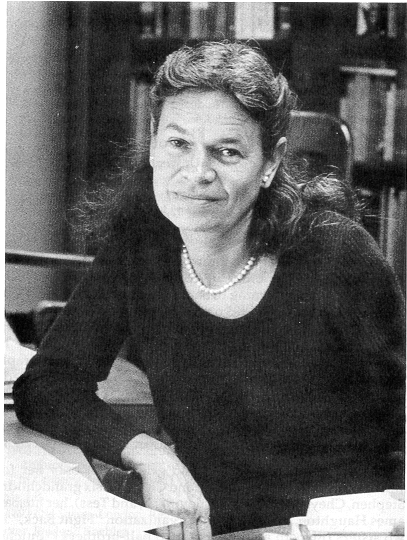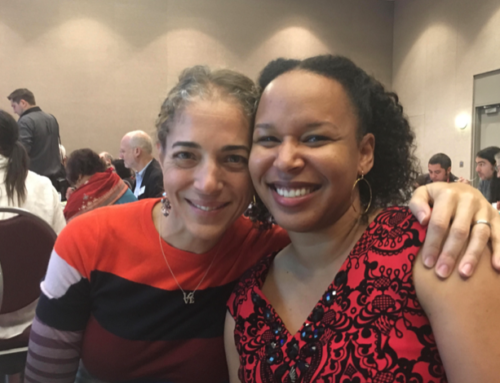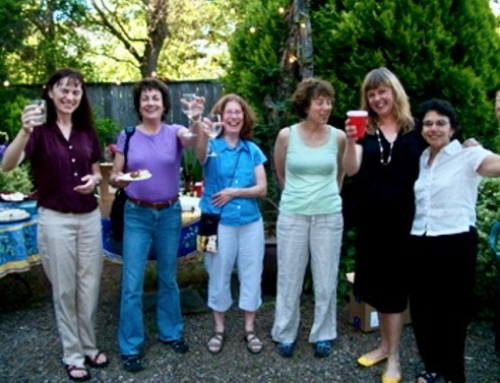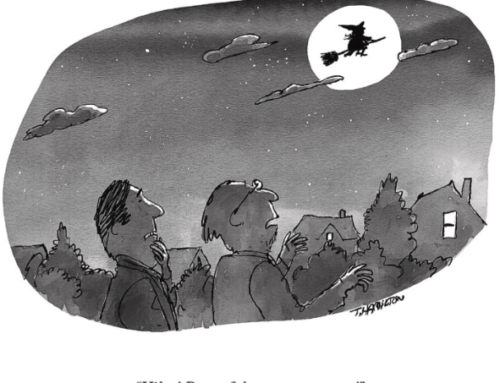Eleanor Burke Leacock (1922-1987) was a foundational theorist in Marxist feminist anthropology. Her concern throughout her prolific scholarly life was with the dynamics of social hierarchies in historical context, and how outcomes are not predetermined, but are results of resistance and whatever emancipatory practices emerge in that context. For Leacock these struggles were not only structural, but were also grounded in everyday practices.

Eleanor Burke Leacock
Eleanor Leacock was born in Greenwich Village to literary critic Kenneth Burke and mathematician Lily Batterham. Her parents encouraged education and expected their daughters to have careers. In 1939, she received a scholarship to Radcliffe and joined a group of student radicals who excelled in coursework, but were deemed socially unacceptable to other students because they were not affluent, held socialist or communist politics, or were Jewish. In her second anthropology course, the professor Alfred Tozzer told the students that, if they wanted to be anthropologists, they had better have independent means, because they would never get a job in anthropology. She remembered thinking with confidence rather than anger, “I’ll show you!” With her first husband Richard Leacock, a Harvard student interested in film making, she moved to New York and enrolled in Barnard in 1942. Her feminism was strengthened when she was denied a drafting assistantship at Columbia despite having received the highest grade in the drafting course; she was told point blank it was because she was a woman.
After graduating in 1944, like many other anthropologists who opposed fascism she sought work in Washington, D.C., at the Office of War Information. While Ruth Benedict and Rhoda Métraux approved her hire, the FBI refused to grant her clearance on the grounds of “premature anti-fascism” — in other words, she opposed fascism before the USA was involved in World War II. As a graduate student at Columbia, she used a small grant from what would become the Wenner-Gren Foundation to conduct field research in Labrador both with and without her husband, but generally “with a baby on my hip.” She wrote her dissertation while caring for two young daughters.
Leacock tackled head-on the prevailing position at the time that so-called hunting and gathering societies were primordially patrilineal, patrilocal, and patriarchal. Her dissertation documented through ethnohistory and contemporary field work the flexible local group composition and kinship practices of Innu people (then termed the Montagnais-Naskapi) in Labrador. She traced transformations of Innu groups and in particular concepts of use versus ownership, sharing, and the emergence of private property with the European fur trade. Even at the time of her fieldwork, most resources remained communal and patriarchal practices were uneven and contested. While her committee pronounced the dissertation “unpublishable,” Elman Service encouraged her to send it to the American Anthropological Association, which published it as their next “Memoir” (Leacock 1954).
Leacock received little help getting a job in the academy. Looking back, she reflected that being a mother was as much of an impediment as her Leftist politics (personal communication). For eleven years she worked on educational projects outside the university, but continued presenting research papers and teaching part-time when the opportunity arose. During these years, her first marriage ended and she became involved with Black activist James Haughton, who became her second husband. Finally, in 1963, Brooklyn Polytechnic Institute hired her full-time and she had the security to complete her reevaluation of Lewis Henry Morgan’s Ancient Society (Leacock 1963). She then turned to publishing from her experiences working on educational projects. Teaching and Learning in City Schools (Leacock 1969) and her comprehensive critique of the “Culture of Poverty” thesis and policies (Leacock 1971) focused on structural racism and attendant policies and practices. As always, she wrote for disparate audiences, and the language and formulations showed her attention to the audiences she sought to inform or persuade.
Leacock was concerned that the emerging women’s movement should avoid ahistorical assertions, what would be called “essentialism,” and also appreciate the crucial influence of class and race on gender, as well as local and movement-based efforts at redress and social justice (Leacock, 1977; Leacock, 1981). Early on she worked with Nancy Lurie on a foundational feminist ethnohistorical volume analyzing transformations of gender relations in Native American peoples with colonialism and capitalist development (Leacock and Lurie, 1971). She wrote a substantive introduction and reappraisal of Engels’ The Origin of the Family, Private Property, and the State (Leacock, 1972), an early feminist anthropological effort to link the emergence of patriarchy with dynamics of class and state formation. This volume influenced generations of feminist anthropologists and historians around the world and established her preeminence as a Marxist feminist theoretician, often at odds with more orthodox Marxists.
Leacock remained committed to feminist scholarship as a collective endeavor. She collaborated with a number of feminist anthropologists in the late 1970s and early 1980s. She and June Nash critiqued Lévi-Strauss and structuralism’s assertion that logical, binary oppositions formed an underlying universal linguistic code that presumed a hierarchy of terms. For structuralists, it followed that maleness, representing culture, was superior to femaleness, representing nature. Empirical societies varied, but all was based on that underlying code. Leacock and Nash provided an empirical critique of assuming binary opposition, ranking of terms where binaries existed, and other ahistorical formulations of gender hierarchies (Leacock and Nash 1977).
She and Mona Etienne edited the first volume of case studies on gender transformations and forms of resistance to patriarchal impositions in Women and Colonization (Leacock and Etienne 1980). Taken together, their own contributions and those of the other scholars underscore the unevenness of patriarchy. Strategies include defense of customary values and practices, adaptations to impositions that attempt to protect communitarian practices, everyday subversions, and the like. The flexibility and context-driven forms of resistance make it incumbent on scholars to appreciate how the diversity of responses to capitalist and ideological impositions make gendered authority complex and patriarchal impositions decidedly uneven. At the same time, local responses are not random since they depend on structural conditions in colonialism, and the creativity of women in the face of colonialism often provide us with patterns for mobilization.
In Gender and Work, she and Helen Safa brought together feminist scholars to analyze the changing dimensions of gendered labor and work; the authors considered gendered work in social reproduction as well as the international division of labor that is shaped by and shapes gendered inequities (Leacock and Safa 1986). They explored the gender, race, and class divisions that necessarily create disparate meanings among “women” and “men.” At the same time, they presented areas of resistance and opposition to violence and repression emerging from those configurations. As a lifelong scholar-activist, Leacock participated in indigenous rights, feminist, anti-racist, anti-colonial, and environmental issues. She appreciated the differences in people’s experiences along the complex interactions of race, gender, and social class, anticipating what future scholars would call intersectionality.
Leacock was criticized for her use of the term “egalitarian societies” to describe gender and other relations of production and reproduction in non-state, non-class societies. She and Richard Lee explored dynamism in what they termed “primitive communist” modes of (re)production in Politics and History in Band Societies (Leacock and Lee 1982). These societies were dynamic, not static for Leacock and in their technical division of work and kinship relations always contained potential for power relations. This potential was generally subverted through ritual, life cycle shifts, complex and contradictory kin relations, or achievements. For her, the term “primitive communist” conveyed the unexploitative character of whatever temporary or contextual authority by kinship, age, gender, and/or achievement operates in such societies. The gendered division of work in such societies was technical rather than social, meaning it had no impact on people’s overall life chances or well-being. Put another way, it could be onerous at times, but not consistently so, and the gendered work was flexible, generally shared, and not a marker or consequence of social superiority or inferiority. Indeed, even given binary notions of gender in the time period in which she wrote, for Leacock definitions of gender were not isomorphic with the rigid categories of this or other patriarchal societies. This kind of technical division of labor could morph into patriarchal oppressions where commodity production distorted the gender division of labor. Correlatively, state demands for labor or taxes in kind or cash could increase or decrease relative authority within conquered communities. These distortions of social reproduction could be exacerbated by patriarchal law codes or pressure by quasi-state entities like churches and missionaries, e.g., designating only men as heads of households. Rather than pigeon-hole Leacock as a “Second Wave” feminist, it is more fruitful to note how her theoretical formulations provided models for later notions of intersectionality to encompass a multiplicity of genders and sexualities. Her emphasis on historical transformations that remain contested, coupled with mobilization through marginalization in scholarship and practice anticipated today’s disparate forms of feminisms seen internationally.
In sum, Eleanor Burke Leacock remains a foundational theoretician in feminist and especially Marxist feminist anthropology. From her first field and ethnohistorical research in Labrador to the field research on youth suicide in Samoa that she was conducting at the time of her death, she practiced intersectionality in her theory and social engagements. Her career trajectory embodied the struggles so many women scholars have confronted, her cooperation and collaboration with others was aimed at producing scholarship that situated gender in the context of class and race, and her commitment to more equitable conditions of life for those struggling with enmeshed hierarchies and oppressions.1
Notes:
[1] For more on Leacock’s contributions, see Constance Sutton’s edited volume published after Leacock’s death (Sutton 1993).
References
Leacock, Eleanor Burke. 1954. “The Montagnais “Hunting Territory” and the Fur Trade.” American Anthropologist Memoir 78.
—–. 1963. “Introduction.” Lewis Henry Morgan, Ancient Society. E.B. Leacock, ed. New York: Macmillan Books. Pp. i-xx.
—–. 1963. Teaching and Learning in City Schools. New York: Basic Books.
—–. 1971. Culture of Poverty: A Critique. New York: Simon and Schuster.
—–. 1972. “Introduction.” The Origin of the Family, Private Property, and the State by Frederick Engels. New York: International Books. Pp. 7-67.
—–. 1977. “Women’s Status in Egalitarian Society: Implications for Social Evolution.” Current Anthropology 19(2):247-275.
—–. 1981. “History, Development, and the Division of Labor by Sex: Implications for Organization.” Signs 7(2): 474-493.
—–. 1983 “Interpreting the Origins of Gender Inequality: Conceptual and Historical Problems,” Dialectical Anthropology 7:263-284.
Leacock, Eleanor Burke and Mona Etienne, eds. 1980. Women and Colonization. New York: Bergin and Garvey/Praeger.
Leacock, Eleanor Burke and Richard Lee, eds. 1982. Politics and History in Band Societies. New York: Cambridge University Press.
Leacock, Eleanor Burke and Nancy O. Lurie, eds. 1971. North American Indians in Historical Perspective. New York: Random House.
Leacock, Eleanor Burke, Helen Safa, et al. 1986. Women’s Work: Development and the Division of Labor by Gender. South Hadley, MA: Bergin and Garvey.
Leacock, Eleanor Burke and June Nash. 1977. Ideologies of Sex: Archetypes and Stereotypes. New York Academy of Sciences Annals 285.
Sutton, Constance, ed. 1993. From Labrador to Samoa: The Theory and Practice of Eleanor Burke Leacock. Washington, D.C.: Association for Feminist Anthropology/American Anthropological Association and IWAC (International Women’s Anthropology Conference).
Cite as: Gailey, Christine Ward. 2021. “Eleanor Burke Leacock and Historical Transformations of Gender: Beyond Timeless Patriarchy.” In “Genealogies of the Feminist Present: Lineages and Connections in Feminist Anthropology,” edited by Lynn Bolles and Mary H. Moran, American Ethnologist website, 24 May 2021, https://americanethnologist.org/features/collections/legacies-and-genealogies-in-feminist-anthropology/eleanor-burke-leacock-and-historical-transformations-of-gender-beyond-timeless-patriarchy
Christine Ward Gailey is Professor Emerita of Anthropology at the University of California, Riverside. Her publications show an abiding concern with feminist
issues in anthropology.



